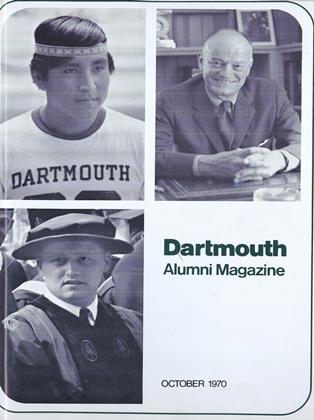By Colonel James A.Donovan ’39. New York: Charles Scribner’sSons, 1970. 265 pp. $6.95
Alfred Vagts in his classic study of militarism draws a sharp distinction between “military” and “militarism” that is fundamental to an understanding of this book. The former, he points out, is concerned with the true function of military forces—to organize the human and material resources of the nation to achieve its objectives with the least expenditure of lives. Militarism, on the other hand, reflects a preoccupation with military forms rather than substance, with the customs, prestige, interests and social views of the military. It is a way of life, a caste and a cult that permeates all of society, dominating industry and the arts and subordinating all other interests of the state to those of the military.
It is in this sense that Colonel Donovan, who entered the Marines on graduation from Dartmouth, uses the term in his Militarism,US.A. As a retired Marine who served in two wars, was twice decorated and has held a variety of responsible and high-level assignments, Col. Donovan considers himself a professional soldier but not a “militarist.” He has no wish to attack the profession he served for over 30 years, or any individual or service. But he is deeply troubled by his country’s aggressive military policies, the increasing tendency to solve problems by force, and by the pervasive influence and harmful effects on American society of a huge defense establishment closely allied with “the vast complex of money, people, industry and vested interests” that make up “the defense-industry team.”
Expanding on an Atlantic Monthly article he wrote with Gen. Shoup, former Com- mandant of the Marine Corps, Col. Donovan traces the growth of militarism in the U. S. from World War II to Vietnam, analyzes its component elements (civilian and military), and shows how the interests, prestige, and rivalries of the military services affect our policies and distort our military strategies. Although the focus is largely on the war in Vietnam, which he believes is a tragic error serving no national purpose and fostered by the interests of competing military services, the volume is more than another critique of the war; it is a detailed study of the way in which a powerful and expanding military establishment has attained a dominant influence in foreign affairs, laid claim to a preponderant share of our national re- sources, successfully asserted its priority over all other national needs, and made war the nation’s leading industry—all in the name of patriotism, national defense, and anti-Com- munism.
Much of the material Donovan presents will come as no great surprise to the informed reader (the chapter on “The Great Bombing Hoax,” which deals with the bombing of North Vietnam, is an exception) but most will be shocked to learn the extent to which the United States has become militarized. In many ways, this is a disturbing and frightening book, more so because it was written by a professional soldier with an intimate knowledge of the military. It raises important questions about issues that affect all our lives and should be made required reading for every citizen concerned about the future of America.
Daniel Webster Professor, Mr. Morton isChairman of the Department of History.
 View Full Issue
View Full Issue
More From This Issue
-
 Cover Story
Cover StoryLiberating the Ph.D.
October 1970 By Robert B. Graham ’40 -
 Feature
FeatureEleazar Is Outdone
October 1970 By Charles Jay Kershner -
 Feature
FeatureThe Dickeys Get Resettled
October 1970 -
 Article
ArticleDear Mr. Cunningham . . .
October 1970 -
 Article
ArticleFaculty
October 1970 By William R. Meyer -
 Sports
SportsBig Green Teams
October 1970 By Jack DeGange
Louis Morton
-
 Feature
FeatureWAR AND HISTORY
FEBRUARY 1963 By LOUIS MORTON -
 Books
BooksTHE GETTYSBURG CAMPAIGN, A STUDY IN COMMAND.
DECEMBER 1968 By LOUIS MORTON -
 Books
BooksTHE AMERICAN CAMPAIGNS OF ROCHAMBEAU'S ARMY 1780, 1781, 1782, 1783. Vol. 1. THE JOURNALS OF CLERMONT-CREVECOEUR, VERGER, AND BERTHIER. Vol. 2. ITINERARIES AND MAPS AND VIEWS.
MARCH 1973 By Louis Morton -
 Books
BooksTHE WAGES OF WAR 1816-1965: A STATISTICAL HANDBOOK.
MARCH 1973 By Louis Morton -
 Books
BooksJUSTICE UNDER FIRE: A STUDY OF MILITARY LAW.
July 1974 By LOUIS MORTON
Books
-
 Books
BooksAlumni Notes
October 1947 -
 Books
BooksTHE FALL OF SAIGON
June • 1985 By David Bowman '63 -
 Books
BooksFOOL'S ERRAND
FEBRUARY 1929 By David Lambuth -
 Books
BooksReadings in Money and Banking
January 1917 By EDMUND E. DAY. -
 Books
BooksQUICK GUIDE TO SPIRITS.
OCTOBER 1972 By JOHN HURD '21 -
 Books
BooksTRANSACTIONS: THE INTERPLAY BETWEEN INDIVIDUAL, FAMILY, AND SOCIETY.
JUNE 1972 By MARTIN D. MERRY, M.D
Louis Morton
-
 Feature
FeatureWAR AND HISTORY
FEBRUARY 1963 By LOUIS MORTON -
 Books
BooksTHE GETTYSBURG CAMPAIGN, A STUDY IN COMMAND.
DECEMBER 1968 By LOUIS MORTON -
 Books
BooksTHE AMERICAN CAMPAIGNS OF ROCHAMBEAU'S ARMY 1780, 1781, 1782, 1783. Vol. 1. THE JOURNALS OF CLERMONT-CREVECOEUR, VERGER, AND BERTHIER. Vol. 2. ITINERARIES AND MAPS AND VIEWS.
MARCH 1973 By Louis Morton

